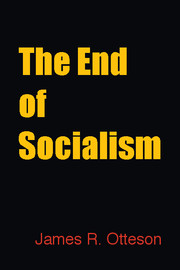Book contents
- Frontmatter
- Dedication
- Contents
- Preface
- Acknowledgments
- 1 What Socialism and Capitalism Are
- Part I Socialism’s Problems in Practice
- Part II Socialism’s Problems in Principle
- 6 Economics and Morality
- 7 Respect and Individuality
- 8 Socialism’s Great Mistake
- 9 Prosperity
- 10 Equality and Freedom
- 11 Fairness
- Conclusion
- Bibliography
- Index
6 - Economics and Morality
Published online by Cambridge University Press: 05 October 2014
- Frontmatter
- Dedication
- Contents
- Preface
- Acknowledgments
- 1 What Socialism and Capitalism Are
- Part I Socialism’s Problems in Practice
- Part II Socialism’s Problems in Principle
- 6 Economics and Morality
- 7 Respect and Individuality
- 8 Socialism’s Great Mistake
- 9 Prosperity
- 10 Equality and Freedom
- 11 Fairness
- Conclusion
- Bibliography
- Index
Summary
Introduction
In Part I, I argued that economic costs were, in fact, moral costs. We are often inclined to dismiss or depreciate economic considerations as being merely about money, as appealing only to lower, even sordid, aspects of our psychology, or as misunderstanding what really matters in life. Yet economics concerns itself with human behavior in a world of scarce resources: with imperfect human beings trying to make their way in a world that offers them less than what they would like. Those two factors mean that conflict is almost inevitable, and conflict, which is sometimes violent, has real costs in human life. Indeed, throughout human history conflict has been one of the main causes of human misery. If economics—or, more properly now, political economy—can figure out a way to mitigate the conflicts, that can be a great good for humanity. One way it might be able to mitigate those conflicts, and thus elevate the quality of life, is to figure out what the institutions are that allow and encourage cooperation instead of conflict. Another would be if it can discover the institutions that allow people, as Adam Smith put it, to better their conditions. So far we have not invoked any theory of justice or fairness; we have talked only about raising humanity out of the grinding poverty and misery that has marked almost all of its existence. That is the real goal of political economy. And it is a moral one.
- Type
- Chapter
- Information
- The End of Socialism , pp. 91 - 116Publisher: Cambridge University PressPrint publication year: 2014



